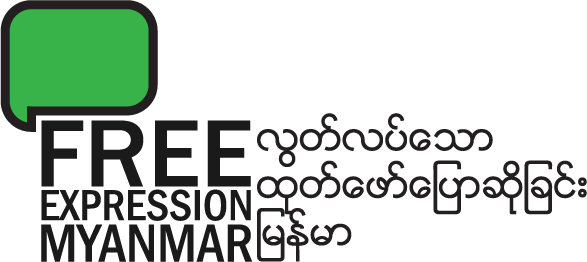Statement by Myanmar civil society organisations on UN silence ကမ္ဘာ့ကုလသမဂ္ဂ၏ နှုတ်ဆိတ်နေမှုအပေါ် မြန်မာနိုင်ငံရှိ အရပ်ဘက်အဖွဲ့အစည်းများ၏ သဘောထား ထုတ်ပြန်ချက်
ကျွန်ုပ်တို့ အရပ်ဘက်အဖွဲ့အစည်းများအနေဖြင့် မြန်မာပြည်ရှိ ကမ္ဘာ့ကုလသမဂ္ဂ၏ နှုတ်ဆိတ်မှုအပေါ် ပြင်းပြင်းထန်ထန် စိုးရိမ်လျှက်ရှိပြီး ယင်းအဖွဲ့အစည်းမှ အကြီးအကဲများအား လက်ရှိမြန်မာပြည်၏ အခြေ အနေအပေါ် အသံထုတ်ပေးရန်နှင့် အရေးယူဆောင်ရွက်မှုများ ပြုလုပ်ရန် တိုက်တွန်းလိုက်သည်။
မြန်မာပြည်အတွင်း လည်ပတ်ဆောင်ရွက်နေသော ကုလသမဂ္ဂ၏အစီအစဉ်များ၊ အေဂျင်စီများ၊ နှင့် ဌာနဆိုင်ရာ များ အရေအတွက်ပေါင်း (၂၀) ရှိသည့် အနက် (၅) ခုမျှကသာ စစ်အာဏာသိမ်းမှုအပေါ် တရားဝင် သဘောထားမှတ်ချက်များ ထုတ်ပြန်ခဲ့သည်။ ၄င်းတို့ (၅) ခုအနက် အဖွဲ့အစည်း (၄) ခု သည် ဆန္ဒထုတ်ဖော်သူ များအပေါ် အလွန်အကြူး အင်အားသုံးဖြိုခွဲမှုအား ရှုတ်ချခဲ့ကြ၍၊ (၂) ခုက အာဏာရှင်ဆန်သည့် ဖမ်းဆီးမှုများ အပေါ် ရှုတ်ချမှုများပြုလုပ်ခဲ့ပြီး၊ ကျန် (၂) ခုက လွတ်လပ်စွာစုဝေးခွင့် နှင့် လွတ်လပ်စွာ ရေးသားထုတ်ဖော်ပြော ဆိုခွင့် အပေါ် အကာအကွယ်ပြုရန် တိုက်တွန်းခဲ့သည်။
မြန်မာပြည်ရှိ ကမ္ဘာ့ကုလသမဂ္ဂဆိုင်ရာ အဖွဲ့အစည်း (၁၅) ခု သည် ၂၀၂၁ ခုနှစ် ဖေဖေါ်ဝါရီလ ၁ ရက်နေ့မှ ယခုချိန်ထိ နှုတ်ဆိတ်နေဆဲ ဖြစ်သည်။
၄င်းကုလသမဂ္ဂဆိုင်ရာ အဖွဲ့အစည်းတစ်ခုချင်းစီသည် အထူးသဖြင့် မြန်မာနိုင်ငံရှိ အကျိုးခံစားခွင့်ရှိသော အုပ်စုများဖြစ်သည့် ကလေးများ၊ သတင်းသမားများနှင့် ဆင်းရဲချို့ငဲ့သူများအတွက် တာဝန်ရှိပေသည်။ ယင်းတာဝန်တွင် ကမ္ဘာ့ကုလသမဂ္ဂမှ အထောက်အပံ့ပြုနေသည့် မြန်မာနိုင်ငံရှိ အကျိုးခံစားခွင့်ရှိသော ထိုသူများ အပေါ် စစ်အာဏာသိမ်းမှုကြောင့် ဖြစ်ပေါ်လာသည့် အကျိုးသက်ရောက်မှုများကို လျော့ပါးသက်သာအောင် ပြုလုပ်ပေးခြင်း ပါဝင်သည်။ နှုတ်ဆိတ်နေခြင်းသည် စစ်အာဏာသိမ်းမှုကြောင့် ဖြစ်ပေါ်လာသည့် အကျိုးဆက် များကို လျော့ပါးသက်သာစေမည် မဟုတ်သည့်အပြင် ရေရှည်တွင် ထိရောက်မှုရှိသော လုပ်ငန်းစဉ်များ အောင်မြင်အောင် အကောင်အထည်ဖော်ရန်အတွက်လည်း သေချာမှု မရှိပေ။ စစ်အာဏာသိမ်းမှုအောက်တွင် မည်သည့် ဝန်ဆောင်မှုလုပ်ငန်းသည်မျှ အကျိုးရှိရှိနှင့် ရေရှည်တည်တံ့နိုင်မည်လည်း မဟုတ်ပေ။
ကမ္ဘာ့ကုလသမဂ္ဂ အထွေထွေအတွင်းရေးမှုးချုပ်သည် သီရိလင်္ကာနိုင်ငံ၌ ၄င်းတို့၏ အားနည်းပျက်ကွက်ခဲ့မှုများ ကို တုန့်ပြန်သောအားဖြင့် ကုလသမဂ္ဂ၏လုပ်ငန်းတွင် လူ့အခွင့်အရေးကို ကာကွယ်မြှင့်တင်ရန်အတွက် ၂၀၁၃ ခုနှစ်၌ လူ့အခွင့်အရေးသည်သာ ပဓာန (Rights Up Front) ဆိုသည့် စီမံချက်ကို စတင်ခဲ့သည်။ ၂၀၁၉ ခုနှစ် ကုလသမဂ္ဂ၏ ရိုဆန်သယ်(လ်) (Rosenthal) အစီရင်ခံစာတွင် “အလွန်အမင်းဆိုးရွားသော လူ့အခွင့်အရေး ချိုးဖောက်မှုများနှင့် ပတ်သက်၍ ကုလသမဂ္ဂ၏ အခြေခံလူ့အခွင့်အရေးဆိုင်ရာ စိုးရိမ်မှုများကို ပိုမိုထိရောက်စွာ စည်းရုံးလှုံ့ဆော်ရန် တာဝန်ရှိသည်” ဟူ၍ ဖော်ပြခဲ့ပြီး၊ မြန်မာနိုင်ငံတွင်းရှိ ကုလသမဂ္ဂ၏ အဖွဲ့အစည်းများ သည်လည်း လူ့အခွင့်အရေးကို ထိန်းသိမ်းကာကွယ်ရန် သီရိလင်္ကာနိုင်ငံမှ အဖြစ်ကဲ့သို့ အလားတူ ပျက်ကွက်ခဲ့ ကြောင်း အသိအမှတ်ပြုခဲ့သည်။
ကမ္ဘာ့ကုလသမဂ္ဂ အဖွဲ့အနေဖြင့် ဤကဲ့သို့ကျရှုံးမှုသံသရာကို ထပ်မံ မဖြစ်ပေါ်ပါစေနှင့်။
ကျွန်ုပ်တို့အနေဖြင့် ကုလသမဂ္ဂဌာနေ ညှိနှိုင်းရေးမှူး Ola Almgren အား လူ့အခွင့်အရေးသည်သာ ပဓာန (Rights Up Front) စီမံချက်ကို ဦးစားပေးဆောင်ရွက်ရာတွင် ကောင်းမွန်သော ခေါင်းဆောင်မှုကို ပြုရန်၊ အထူးသဖြင့် စီမံချက်ပါ လုပ်ဆောင်ချက် ၃ အရ “မြေပြင်တွင်ဖြစ်ပေါ်နေသော အခြေအနေများနှင့် သဟဇာတဖြစ်သော မဟာဗျုဟာကို ချမှတ်သေချာစေပြီး ကုလသမဂ္ဂဖွဲ့စည်းပုံစနစ်၏ စွမ်းဆောင်ရည်ကို ဘက်ပေါင်းစုံမှ တညီ တညွတ်တည်း တိုးမြှင့်ဆောင်ရွက်ရန်” တိုက်တွန်းလိုက်သည်။
ယခုအချိန်အထိ နှုတ်ဆိတ်နေဆဲဖြစ်သော မြန်မာနိုင်ငံရှိ အောက်ဖော်ပြပါ ကုလသမဂ္ဂအဖွဲ့အစည်းများ၏ အကြီးအကဲများကိုလည်း ၎င်းတို့၏တိတ်ဆိတ်နေမှုကို လူသိရှင်ကြားအဆုံးသတ်ပေးရန်၊ ၄င်းတို့နှင့် သက်ဆိုင် သည့် အကျိုးခံစားခွင့်ရှိသူများ ကြုံတွေ့နေရသည့် အန္တရာယ်များအကြောင်း ကမ္ဘာကြီးအား သတင်းအချက်အ လက်များထောက်ပံ့ရှင်းလင်းတင်ပြရန် နှင့် လက်တွေ့ဆောင်ရွက်ချက်များကို ကတိကဝတ်ပြုအကောင်ထည် ဖော်ရန် အတိအလင်း တောင်းဆိုတိုက်တွန်းလိုက်ပါသည်။
- Titon Mitra, UNDP
- Bijay Karmacharya, UN-HABITAT
- Hai Kyung Jun, UNHCR
- Stephen L. Anderson, WFP
- Xiaojie Fan, FAO
- Min Jeong Kim, UNESCO
- Paul Luchtenburg, UNCDF
- Stephan Paul Jost, WHO
- Marie Spaak, UNOCHA
- Benedikt Hofmann, UNODC
- Rudy Luis Juanito, UNDSS
- Akio Nakayama, IOM
- Oussama Tawil, UNAIDS
- Andrew Kirkwood, UNOPS
- Sylvie Betemps Cochin, ITC.
နောက်ဆုံးအနေဖြင့် မြန်မာနိုင်ငံရှိ ကုလသမဂ္ဂအဖွဲ့အစည်းများမှ ဝန်ထမ်းများအားလုံးအား အရပ်ဘက်အဖွဲ့အ စည်းများ၏ စိုးရိမ်မှုများကို ကုလသမဂ္ဂအဖွဲ့အစည်းအချင်းချင်းကြား ဆောင်ကြဥ်းကြရန်နှင့်၊ ဤအရေးပေါ် ကာလအတွင်း ကုလသမဂ္ဂ၏တာဝန်များအရ လူ့အခွင့်အရေးသည်သာ ပဓာန (Rights Up Front) စီမံချက်အား မိမိတို့၏ ကုလသမဂ္ဂအဖွဲ့အစည်းများမှ ချက်ချင်းနှင့် ထိထိရောက်ရောက် အကောင်အထည်ဖော်ဆောင်ရွက်ရာ တွင် တာဝန်ခံမှုရှိစေရေးအား မြန်မာပြည်သူများကိုယ်စား ကိုင်တွယ်ဆောင်ရွက်ပေးကြပါရန် တိုက်တွန်းအပ်ပါ သည်။
We, representatives of Myanmar civil society organisations, are seriously concerned by the silence of the United Nations in Myanmar and urge its leaders to speak out and take action.
A derisory 5 out of 20 UN programmes, agencies, and departments operating inside Myanmar have publicly commented on the military coup. Of the 5, 4 have condemned the excessive use of force against protesters, 2 have condemned arbitrary detention, and 2 have called for the protection of the rights to freedom of assembly and expression.
15 UN institutions in Myanmar have remained silent since 1 February 2021.
Each of these UN institutions has a responsibility to a particular beneficiary group in Myanmar, such as children, journalists, or those living in poverty. This responsibility includes mitigating any impact of the military coup on those beneficiaries that the UN pertains to support. Keeping silent will not mitigate the impact of the coup or ensure effective operational delivery in the long-term. No services can be effectively and sustainably delivered under the military coup.
The UN Secretary-General launched the Rights Up Front initiative in 2013 to put human rights at the core of all UN work in response to its failings in Sri Lanka. The UN acknowledged in its 2019 Rosenthal report that UN institutions in Myanmar had similarly failed to uphold human rights: “there is a shared responsibility [to convey] more forcefully the United Nations’ principled concerns regarding grave human rights violations”.
The UN must not repeat this cycle of failure.
We call on Ola Almgren, UN Resident Coordinator, to provide greater leadership in prioritising the Rights Up Front initiative, especially Action 3 on “ensuring coherent strategies of action on the ground and leveraging the UN System’s capacities to respond in a concerted manner”.
We also explicitly call on the heads of the following UN institutions in Myanmar – who have been silent until now – to publicly end their silence, to elaborate on the risks faced by their beneficiaries, and to commit to taking action:
- Titon Mitra, UNDP
- Bijay Karmacharya, UN-HABITAT
- Hai Kyung Jun, UNHCR
- Stephen L. Anderson, WFP
- Xiaojie Fan, FAO
- Min Jeong Kim, UNESCO
- Paul Luchtenburg, UNCDF
- Stephan Paul Jost, WHO
- Marie Spaak, UNOCHA
- Benedikt Hofmann, UNODC
- Rudy Luis Juanito, UNDSS
- Akio Nakayama, IOM
- Oussama Tawil, UNAIDS
- Andrew Kirkwood, UNOPS
- Sylvie Bétemps Cochin, ITC
We finally urge all staff working in the UN institutions in Myanmar to convey civil society’s concerns within and to act on behalf of the Myanmar people by holding those institutions to account in seeking immediate and effective implementation of the Rights Up Front initiative commensurate with the UN’s responsibilities during this emergency time.
